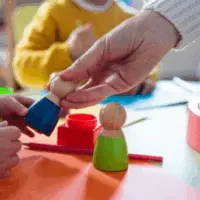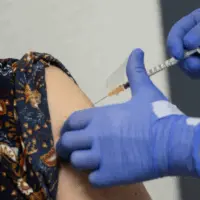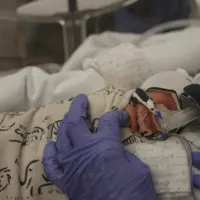
(NEW YORK) — Tens of thousands of children and families could be affected by dozens of Head Start programs potentially closing if the federal government shutdown extends past Nov. 1.
About 134 programs across 41 states and Puerto Rico will see their operational funding cease on Saturday, affecting nearly 65,000 kids, or 10% of all Head Start children, according to the National Head Start Association (NHSA).
Florida, Georgia, Missouri and Ohio may see the most impacts, potentially affecting more than 24,000 children and more than 7,500 staff members, NHSA data shows.
Head Start is a federal program run by the U.S. Department of Health and Human Services that provides early childhood education, health, nutrition and family support services to low-income children and families.
Programs shutting down could mean that children under age 6 could lose access to preschool education, health services and referrals. Families could lose access to affordable childcare that allows parents to work, attend school or undergo job training.
“We are concerned that the longer a government shutdown runs, the more likely it is that Head Start programs might be faced with potential closures and having deep impacts on children and families that we serve,” Tommy Sheridan, deputy director of NHSA, told ABC News. “The longer the shutdown goes, the more that number will increase and, at the end of the day, children and families should never be put at risk because of political gridlock. However, that’s exactly what’s happening right now.”
Programs struggle to find funding
Sheridan said not all of the 134 programs affected will close in November. Some are reaching out to state and local leaders and some are asking private organizations for funding, which may cover costs for a short period of time.
He said there are 1,600 programs across the U.S. so, while a majority of Head Start programs will not be affected after Nov. 1, it is still a substantial number that will either be struggling to remain open or may have to close.
An HHS spokesperson told ABC News that Democrats are to blame for the government shutdown and that, when the shuthown is over, the HHS’ Office of Head Start will work to expedite grant awards.
Central Kentucky Community Action Council Head Start and Early Head Start (CKCAC), which serves 400 children in nine centers across six counties, will lose access to an $8 million federal grant on Nov. 1, Bryan Conover, executive director of CKCAC, told ABC News.
Although CKCAC’s Head Start policy council affirmed unanimously to allow the group to pursue a line of credit for about $1 million with a local bank, it will only allow operations to be maintained until Nov. 21.
“All 400 of those families could be put in a situation where, if we have to close our doors, they’re going to choose whether or not to take care of their kids or work,” Conover said. “And so there really is multiple ripples of pain that ceasing operations would cause, and we’re hoping beyond hope that this shutdown ends very soon, that we don’t have to go through those painful conversations.”
Conover said if the shutdown extends past Nov. 21, “it’s going to make for some very unfortunate Thanksgiving situations.”
“If we get to Nov. 22 and we don’t have funding available, and we have to close our doors and SNAP may not be in place yet, we’re going to have vulnerable families missing out on nutrition for their kids, let alone education, let alone therapy, let alone the other supports they need to be able to be kindergarten-ready and let alone the impacts on the families who are going to have to make choices to potentially work or stay home to provide child care,” he continued.
The Ohio Head Start Association said seven providers serving more than 3,700 kids are at risk of closing because their federal funds will be exhausted on Nov. 1. The association said closures could force 940 staff members out of work.
“Every day the shutdown continues, Ohio children and families are paying the price,” said Julie Stone, executive director of the OHSA said in a statement. “Head Start is not a political issue — it’s a lifeline. Congress must act now to restore funding, keep classrooms open, and protect the stability of families, the staff who serve them, and communities.”
Closures could affect childhood development
Dr. Lindsey Burghardt, chief science officer at the Center on the Developing Child at Harvard University, said there could be negative effects on development from Head Start programs ending so suddenly.
She said these services help support children’s healthy physical and mental development through education, nutrition, having consistently available and responsible caregivers and having safe and clean places to play and learn.
Head Start programs may be the only way by which children receive nutritious meals, get health screenings or receive early intervention for developmental delays and special education.
“When you disrupt it, especially when you destabilize these services suddenly, I think you have the potential to disrupt healthy brain development, to derail the healthy development of all these other organ systems,” Burghardt told ABC News.
“And that’s important, because it can disrupt mental and physical health in childhood, but actually, really importantly, can disrupt health and well-being across those children’s life spans and have really long-lasting developmental implications,” she added.
Burghardt said the longer or larger disruption to these services, the more potential to negatively impact a child that could span throughout adolescence and decades later, when they’re an adult.
This can include poor academic and cognitive function as well as greater behavioral problems, Burghardt said.
The NHSA said research has shown Head Start programs have short-term and long-term impact, including less chronic absenteeism in middle school, improved high school graduation rates, increased higher education enrollment and completion and a decreased reliance on public assistance.
Sheridan said families, including parents and caregivers, may also feel negative impacts from Head Start programs shutting down.
“Families that are eligible for Head Start often work multiple jobs,” he said. “They might be in college or community college or a technical college or are in job training programs. … So the families that are in Head Start, they’re doing everything that they can to try to better their situation and their child’s situation. They count on Head Start to be there so that they can navigate whatever they need to in order to be able to provide for their families.”
Sheridan went on, “Without Head Start, many parents will have no affordable child care option. They may be forced to leave their jobs. They may … reduce the hours that they might be working, not attend class, different things like that, horrible decisions that families do not want to have to make … and it’s going to be incredibly destabilizing and challenging.”
Copyright © 2025, ABC Audio. All rights reserved.














